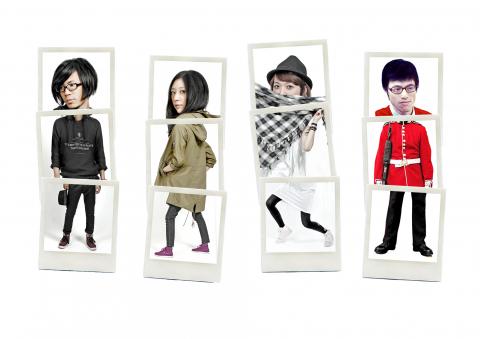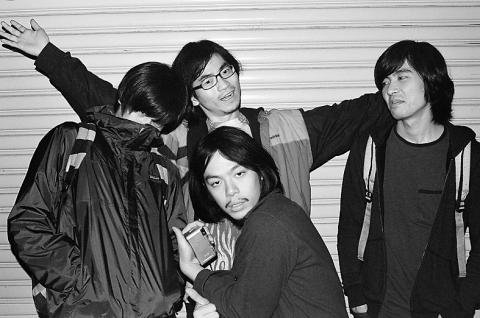Indie rock fans in Kaohsiung are being offered variety tonight, with live music from one band that wields pop rock noise on electric guitars and another that pumps out beats on laptop computers.
Both aim to have the audience dancing. Touming Magazine (透明雜誌) and Unfamiliar Friends Party (不熟的朋友派對), both based in Taipei, are performing at the Pier 2 Art District (高雄駁二藝術特區) to promote newly released CDs.
Touming Magazine’s guitar-heavy sound and tightly arranged songs clearly nod to their musical heroes, mostly American alternative rock bands from the late 1980s and early 1990s like the Pixies, Weezer and Superchunk.

Photo Courtesy of Unfamiliar Friends Party and Touming Magazine
Twenty-eight-year-old Hung Shen-hao (洪申豪), who is the frontman of the four-piece group and mostly sings in Mandarin, says he feels “young people” don’t share the same musical tastes as the band, but that doesn’t bother him. “We just play the music we like,” he told the Taipei Times.
Touming Magazine recently released a full-length debut album titled Soul Music (我們的靈魂樂), and its pep and solid repertoire ought to have concertgoers moving to the music.
The evening starts with a set of electronica rock from Unfamiliar Friends Party. Tonight’s show is being billed as the band’s official release party in Kaohsiung for its new six-song EP titled Headstrong (頭好壯壯).

Photo Courtesy of Unfamiliar Friends Party and Touming Magazine
Unfamiliar Friends, a four-piece group (currently a trio with one member studying abroad), performs all of its music on Macbooks, MIDI controllers and electronic keyboards.
The group’s beats favor new wave rock grooves, and the music is full of spacey atmosphere with melodies built on video game-like sounds.
“All the people that hear our music say it’s joyful,” band member Lily Chen (陳郁欣) said.

Towering high above Taiwan’s capital city at 508 meters, Taipei 101 dominates the skyline. The earthquake-proof skyscraper of steel and glass has captured the imagination of professional rock climber Alex Honnold for more than a decade. Tomorrow morning, he will climb it in his signature free solo style — without ropes or protective equipment. And Netflix will broadcast it — live. The event’s announcement has drawn both excitement and trepidation, as well as some concerns over the ethical implications of attempting such a high-risk endeavor on live broadcast. Many have questioned Honnold’s desire to continues his free-solo climbs now that he’s a

As Taiwan’s second most populous city, Taichung looms large in the electoral map. Taiwanese political commentators describe it — along with neighboring Changhua County — as Taiwan’s “swing states” (搖擺州), which is a curious direct borrowing from American election terminology. In the early post-Martial Law era, Taichung was referred to as a “desert of democracy” because while the Democratic Progressive Party (DPP) was winning elections in the north and south, Taichung remained staunchly loyal to the Chinese Nationalist Party (KMT). That changed over time, but in both Changhua and Taichung, the DPP still suffers from a “one-term curse,” with the

Jan. 26 to Feb. 1 Nearly 90 years after it was last recorded, the Basay language was taught in a classroom for the first time in September last year. Over the following three months, students learned its sounds along with the customs and folktales of the Ketagalan people, who once spoke it across northern Taiwan. Although each Ketagalan settlement had its own language, Basay functioned as a common trade language. By the late 19th century, it had largely fallen out of daily use as speakers shifted to Hoklo (commonly known as Taiwanese), surviving only in fragments remembered by the elderly. In

William Liu (劉家君) moved to Kaohsiung from Nantou to live with his boyfriend Reg Hong (洪嘉佑). “In Nantou, people do not support gay rights at all and never even talk about it. Living here made me optimistic and made me realize how much I can express myself,” Liu tells the Taipei Times. Hong and his friend Cony Hsieh (謝昀希) are both active in several LGBT groups and organizations in Kaohsiung. They were among the people behind the city’s 16th Pride event in November last year, which gathered over 35,000 people. Along with others, they clearly see Kaohsiung as the nexus of LGBT rights.